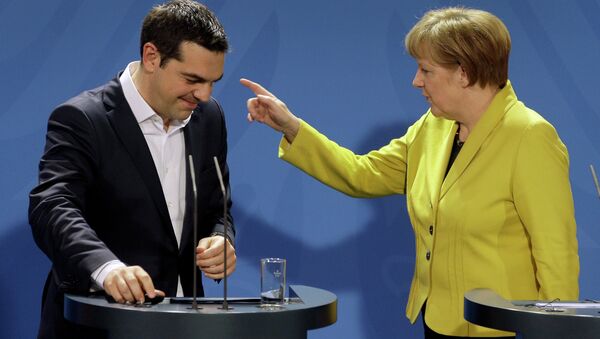MOSCOW (Sputnik), Anastasia Levchenko — Reports that Germany has benefited from the ongoing Greek crisis by over $100 billion need further detailed consideration, a representative of the Ifo Institute for Economic Research told Sputnik on Tuesday.
On Monday, the Leibniz Institute of Economic Research issued a report claiming that Germany, one of the biggest Greek creditors, has benefited considerably from the Greek crisis in the last five years. The German government derived increased revenue through a higher inflow of investors, who considered German government bonds to be a safe haven amid the Greek crisis, leading to a fall in interest rates, the report revealed.
"The state budget has been taking advantage of the low interest rate. If it’s only because of Greece – that’s another question. However, you should take into consideration that low interest rates are not so good for people who have made savings, especially for example savings abroad, like life insurance companies," the media officer of the Ifo Institute for Economic Research told Sputnik.
On Monday, President of the Ifo Institute Hans-Werner Sinn reminded that not only government, but also private economic entities can make the state a net creditor, and should be taken into account.
"The IWH calculations were made based on the German government, but Germany is not just a government debtor, but also [comprises] private depositors who as the holders of foreign assets are also affected by interest rate cuts," Sinn said in a statement emailed to Sputnik.
During the ongoing Greek economic crisis, Germany has taken a tough stance on bailout demands, prompting Athens to quickly pass unpopular laws to raise taxes and cut pensions.
On July 17, the German parliament passed a third package of aid to Greece, estimated at $95 billion over the next three years.
Greece owes about $270 billion of its $350-billion total debt to its main creditors — the European Central Bank (ECB), the International Monetary Fund (IMF) and some eurozone countries.
Earlier in the day, the European Commission's spokesperson for economic and financial affairs confirmed that Athens and its international creditors had reached a technical agreement.





